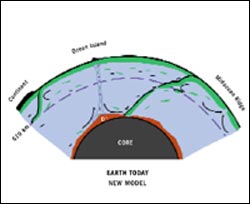Science honors the top ten research advances of 2005
Evolution has been the foundation and guiding theory of biology since Darwin gave the theory its proper scientific debut in 1859. But Darwin probably never dreamed that researchers in 2005 would still be uncovering new details about the nuts and bolts of his theory — how does evolution actually work in the world of influenza genes and chimpanzee genes and stickleback fish armor? Studies that follow evolution in action claim top h

Earth’s future was determined at birth. Using refined techniques to study rocks, researchers at the Carnegie Institution’s Department of Terrestrial Magnetism (DTM) found that Earth’s mantle–the layer between the core and the crust–separated into chemically distinct layers faster and earlier than previously believed. The layering happened within 30 million years of the solar system’s formation, instead of occurring gradually over more than 4 billion years, as the standard model suggests. The ne
Geologic features at the Opportunity landing site on Mars were formed not by a lake that evaporated but by constant strikes from meteorites, say two Arizona State University geologists.
The site where the Mars Exploration Rover Opportunity landed has sediments and layered structures that are thought to be formed by the evaporation of an acidic salty sea. The prevailing thought is that when this Martian sea existed it may have supported life forms and thus would be a prime site
The second member of Europe’s new generation of weather satellites has successfully been lifted onto orbit, continuing an uninterrupted series of launch successes since 1977.
This ninth Meteosat satellite, developed on behalf of EUMETSAT under the aegis of the European Space Agency, will reinforce EUMETSAT’s capacity to monitor the Earth atmosphere above Europe, Africa, the Middle-East and the Atlantic Ocean.
MSG-2 (2nd flight model of Meteosat Second Generation) was o

Global warming may decimate the top 10 feet (3 meters) or more of perennially frozen soil across the Northern Hemisphere, altering ecosystems as well as damaging buildings and roads across Canada, Alaska, and Russia. New simulations from the National Center for Atmospheric Research (NCAR) show that over half of the area covered by this topmost layer of permafrost could thaw by 2050 and as much as 90 percent by 2100. Scientists expect the thawing to increase runoff to the Arctic Ocean and relea
The effects of overfishing may have driven marbled murrelets, an endangered seabird found along the Pacific coast, to increasingly rely upon less nutritious food sources, according to a new study by biologists at the University of California, Berkeley.
The results, to be published online by early March 2006 in the journal Conservation Biology, suggest that feeding further down the food web may have played a role in low levels of reproduction observed in contemporary murrelet population